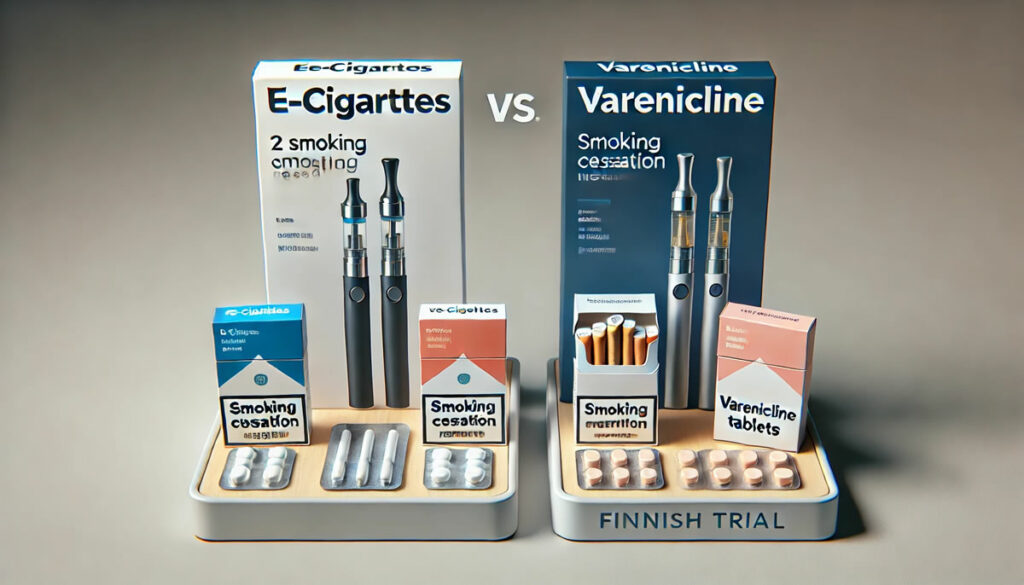A recent single-center randomized trial conducted by researchers at Lapland Central Hospital has shed light on the comparative effectiveness of nicotine-containing e-cigarettes and varenicline (Chantix) in helping long-term smokers quit conventional cigarettes. The study, published in JAMA Internal Medicine, found that while both methods showed similar short-term benefits, varenicline demonstrated more lasting effects.
Short-Term Success Rates
The trial, led by Anna Tuisku, PhD, and her colleagues, included 458 participants with moderate to heavy nicotine dependence. At the 26-week mark, the primary endpoint of the study, confirmed 7-day abstinence from smoking was observed in:
- 40.4% of participants using nicotine-containing e-cigarettes
- 43.8% of those taking varenicline
- 19.7% of those on placebo
While both e-cigarettes and varenicline showed significantly higher success rates compared to placebo (P<0.001), the difference between the two interventions was not statistically significant.
Long-Term Outcomes Favor Varenicline
However, at the 52-week follow-up, the rates of confirmed abstinence, as measured by exhaled carbon monoxide (CO), dropped to 28% for the e-cigarette group and 37.9% for the varenicline group. At this point, only the benefit with varenicline remained significantly greater than placebo.
The researchers acknowledge that nicotine-containing e-cigarettes may play a role in reducing tobacco-related health risks for adults who heavily depend on nicotine and have struggled to quit smoking conventional cigarettes despite multiple attempts. However, they suggest that varenicline should be the primary recommendation for those seeking to terminate their smoking habit.
Potential Appeal of E-Cigarettes
Joan Burnham, MSN, RN, of Houston Methodist Sugar Land Hospital, noted that the success of e-cigarettes might be attributed to their similarities to traditional cigarettes, which could make them more appealing to smokers. “The use of ECs mimic the behavior pattern for smoking with the inhalation and hand/oral connection, which many people who smoke find relaxing and calming,” she explained.
Study Design and Limitations
The EFFECT trial randomized participants into three groups: nicotine-containing e-cigarettes (plus placebo tablets), varenicline tablets (plus nicotine-free e-cigarettes), or placebo (nicotine-free e-cigarettes and placebo tablets) for 12 weeks. All patients also received a motivational interview by a trained nurse, and the study was blinded to participants, nurses, and researchers.
The authors acknowledged several limitations, including the single-center design, relatively small sample size, brief follow-up period, and the potential for different nicotine concentrations in other vaping products.
Impressive Results Given Participants’ Smoking History
Despite these limitations, Tuisku’s group emphasized that the success in achieving smoking cessation among participants in the trial “must be viewed as relatively impressive considering the durations of their smoking histories and the resulting intensity of their nicotine dependence.”
As the debate surrounding the role of e-cigarettes in smoking cessation continues, this study provides valuable insights into their comparative effectiveness with varenicline, the current gold standard. Further research with larger sample sizes and longer follow-up periods will be crucial in determining the most effective strategies for helping smokers quit and improve their overall health.
- UK Announces Mandatory Vape Tax and Duty Stamps from 2027 - February 10, 2026
- Sri Lanka Travel 2026: Total Ban on Cigarettes & Vapes - February 5, 2026
- NY Tax Proposal: Hochul Targets ZYN with 75% Levy - January 29, 2026


